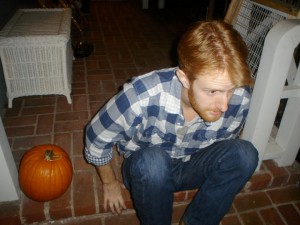
Tim Fosbury, MAPH ’12, reflections on the MAPH year and his internship at the Project on Civic Reflection.
Two phrases stick out in my mind from my MAPH year. First is David Wray’s assertion, during one of our first core lectures no less, that we could expect MAPH to be a sort of “P90X for the soul.” Those words stuck right away and proved correct in many ways, most of them good. Second was something I heard from various mentors, advisors, and professors. This was the idea that “as humanities scholars, it is easy to forget that we are actually a part of humanity.” That is, we spend so much time reading, critiquing, and analyzing humanity, that we often inadvertently forget to participate in it. This separation was something I tried to avoid, but during the drudges of thesis and seminar paper time – those days when I started having imaginary conversations with Cormac McCarthy and the Judge from Blood Meridian began taunting me in my dreams -I began paying more and more attention to those second set of words. So, I then started to look for outlets where I could take my academic training beyond the classroom.
I was lucky when the Project on Civic Reflection was offered as one of the internships this past summer. Based on their website and the internship description, I wasn’t quite sure what I’d be doing with the organization, but there was something that drew me to it. All I knew going in was that PCR facilitated discussions, and trained facilitators to lead their own discussions, with community and civic organizations around the country. But I soon learned that these were not typical discussions that revolved around the illusion of solving large problems in an hour or creating action plans full of empty verbiage. Rather, they were spaces of reflection on why we do the work we do, or what we expect to accomplish in civic work, with no pressure to resolve anything, but only to consider closely these larger themes. And during my internship I was lucky enough to participate in discussions that ranged from education to idealism in non-profit work to racism and segregation in Chicago. What impressed me in each discussion was how the PCR model was able to bring people together from various backgrounds and foster serious and considered dialogue.
Most of my duties, however, were in the day to day operations of PCR. During the internship, I was lucky to work alongside another MAPH intern, Anna Paustenbach. Together, we worked on developing PCR’s soon to be unveiled new website, program research, and the exploration of potential partnerships for the organization. While performing these duties, I was given a sort of crash course on non-profit administration and logistics. By being behind the scenes, and acting as a sponge around my bosses, Adam Davis and Kelli Covey, I learned the amount and type of work necessary to build a meaningful organization that is capable of having a broad impact in its community. PCR, I learned during this time, is something special. It has its vision and it has its method and with each conversation and each training, it’s making a difference in our city.
Like all else in MAPH, my internship was over too quickly. Its impact, though, is lasting. During the brief twelve weeks I spent at the Project on Civic Reflection, I had the opportunity to meet and speak with people from all over Chicago who I normally would not have met. I saw the city from a new perspective. I saw its connections, its differences, and the vital role that reflective dialogue has in our culture. Finally, my experiences with PCR helped me focus my own interests and skills. As I teach this semester at Harold Washington College, I find myself often using the PCR model to get my students thinking beyond the classroom and academics as a means to consider their connections to their community. It may sound sentimental or sappy, but my experiences at the Project on Civic Reflection were transformative. The work they perform is necessary and to have had the opportunity to be a part of it will inform my own work for years to come.
Leave a Reply